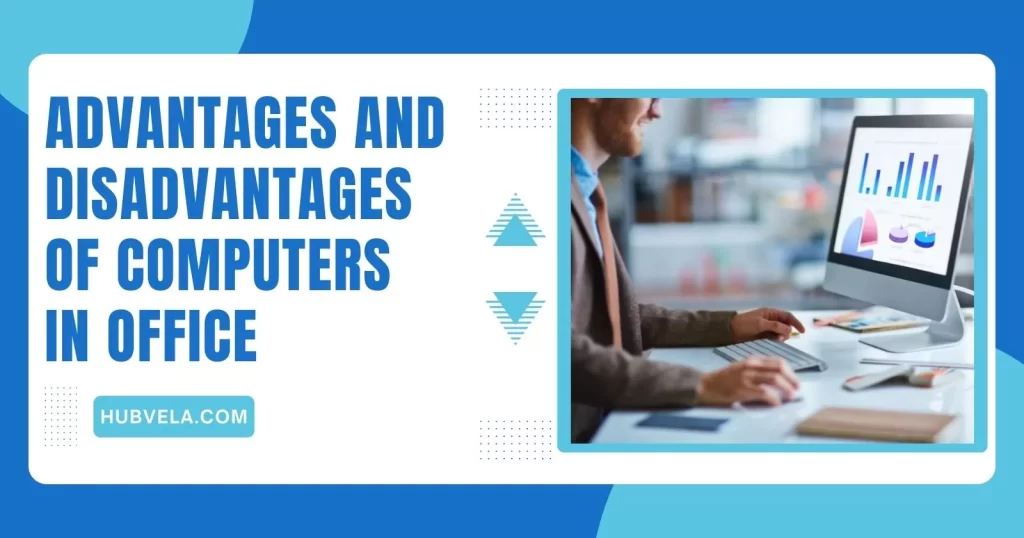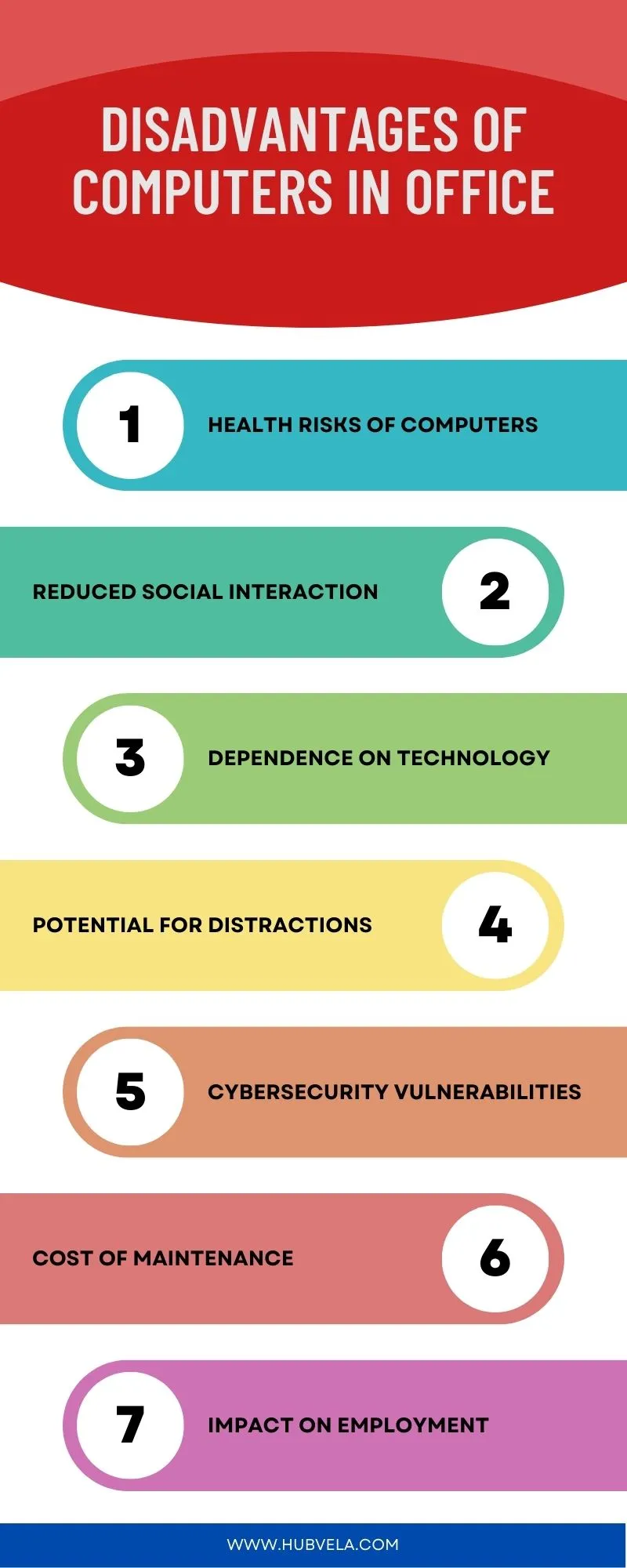Are you curious about the perks and pitfalls of incorporating computers into your office environment? Well, look no further! In this article, we will explore the advantages and disadvantages of computers in office.
Computers have the power to enhance productivity, streamline workflows, and improve data accuracy. They also provide efficient communication channels.
However, it’s important to be aware of the potential cybersecurity vulnerabilities that come with computer usage. Additionally, the cost of maintenance and the impact on employment are factors that should be considered.
By the end of this article, you will have a better understanding of the pros and cons of computers in the office.
So, let’s dive in!

--Advertisement--
Advantages of Computers in Office
Computers have become an essential tool in the workplace, offering numerous benefits that enhance productivity and efficiency. Some of the key advantages of using computers in an office environment include:

1. Increased Productivity Levels
With computers in the office, you can significantly boost your productivity levels. The increased efficiency and time savings that computers provide allow you to complete tasks at a faster pace.
Additionally, computers facilitate improved collaboration among team members, enabling seamless communication and the sharing of ideas and files.
With remote work capabilities, computers also allow you to work from anywhere, providing flexibility and convenience.
Furthermore, the automation benefits of computers streamline repetitive tasks, freeing up time for more important work.
2. Streamlined Workflow Processes
To optimize workflow processes in the office, computers allow you to streamline tasks and complete them more efficiently. With automated processes, you can experience improved efficiency and significant time savings.
Computers enable you to optimize workflows, eliminating unnecessary steps and reducing manual labor. By automating repetitive tasks, you can focus on more important aspects of your work.
Additionally, computers contribute to increased accuracy, minimizing errors and ensuring a higher level of precision in your office processes.
3. Improved Data Accuracy
By utilizing computers, you can enhance data accuracy in the office. Computers offer improved efficiency through automated processes, which minimize errors and ensure data integrity.
With accurate and reliable data, decision making is enhanced, leading to better outcomes for the organization.
4. Enhanced Communication Channels
Improve office communication channels through the use of computers.
With remote collaboration and real-time communication, computers enable virtual meetings, enhancing connectivity among team members.
Through digital documentation, information can be easily shared and accessed, making it convenient for everyone involved.
Computers provide efficient and effective means of communication, enabling seamless collaboration and promoting productivity in the office.
Take advantage of these benefits to streamline communication and improve overall office operations.
5. Cost-Saving Opportunities
Save money in the office by utilizing computers for various tasks and processes.
Computers offer many cost-saving opportunities such as energy efficiency, remote work possibilities, streamlining processes, and reducing paper waste.
By using computers, you can save on energy costs as they consume less power compared to traditional office equipment.
Additionally, computers allow for remote work, reducing office space expenses.
They also streamline processes, saving time and increasing productivity.
Lastly, computers help reduce paper waste, leading to cost savings on paper and printing supplies.
6. Access to Vast Information
You can benefit from computers in the office by having access to a vast amount of information.
With computers, you can easily access information from various sources, allowing for efficient knowledge sharing and collaboration among employees.
Additionally, computers enable effective data management, making it easier to organize and store large amounts of data.
Furthermore, computers enhance research capabilities, enabling employees to gather information quickly and accurately.
Ultimately, this access to information facilitates the decision-making process, leading to more informed and effective decisions.
7. Efficient Task Management
Computers in the office streamline task management, enhancing productivity and efficiency for employees. With the help of technology, task prioritization becomes easier, allowing you to focus on the most important tasks first.
Time management is also improved as you can set reminders and deadlines for each task. Project tracking becomes seamless, as computers enable you to monitor progress and identify potential bottlenecks.
Automation benefits save time and effort, while resource allocation becomes more accurate and optimized.
Disadvantages of Computers in Office
Computers have become an integral part of office environments, offering various benefits such as increased efficiency and easier access to information.
However, they also come with several disadvantages that should be carefully considered. Some of the key drawbacks of computers in the office include:

1. Health Risks of Computers
The use of computers in the office can pose health risks due to prolonged sitting and exposure to screen radiation.
These risks include eye strain, musculoskeletal disorders, and a sedentary lifestyle.
Staring at a computer screen for extended periods can cause eye strain, leading to blurred vision and headaches.
Prolonged sitting can result in musculoskeletal disorders such as back pain and neck stiffness.
Additionally, the sedentary nature of computer work can contribute to weight gain and increased stress levels.
2. Reduced Social Interaction
Are you missing out on valuable social interactions in the office due to the use of computers?
While computers have improved productivity, they’ve also had a negative impact on teamwork and reduced creativity.
The lack of face to face communication has led to a loss of personal touch, resulting in decreased collaboration and a decline in the overall quality of work.
Moreover, the reliance on computers has been linked to negative effects on mental health, further emphasizing the need for balance between technology and human interaction.
3. Dependence on Technology
To further highlight the downsides of computers in the office, let’s delve into the extent to which you may become overly reliant on technology.
Technology addiction can take hold, leading to a loss of manual skills and a decrease in critical thinking.
The reliance on the internet for information and communication can hinder problem-solving abilities.
Moreover, the constant use of computers can disrupt work-life balance, blurring the line between personal and professional life.
4. Potential for Distractions
Your focus and productivity can be easily disrupted by the constant availability of social media platforms and online entertainment, which are potential distractions in the office.
These distractions can lead to time management issues, concentration problems, and ultimately have a negative impact on your productivity.
It’s important to find a balance between utilizing technology for work purposes and avoiding its potential distractions to maintain a healthy work-life balance.
5. Cybersecurity Vulnerabilities
You can be at risk of cyberattacks and data breaches due to the cybersecurity vulnerabilities present in office computers.
It’s essential to implement robust security measures to protect your sensitive data. Conducting regular vulnerability assessments and implementing network protection protocols are crucial steps to safeguarding your office computers.
Cyber attacks are on the rise, and staying vigilant and proactive in maintaining a strong security posture is vital to mitigate the risks of data breaches.
6. Cost of Maintenance
Implementing robust security measures to protect against cyberattacks and data breaches is crucial. However, another disadvantage of office computers is the cost of maintenance. Maintenance costs, including hardware upgrades and software updates, can quickly add up.
Additionally, training requirements for employees to effectively use and troubleshoot computer systems can be time-consuming and expensive. Furthermore, system downtime during maintenance can disrupt workflow and productivity, resulting in potential financial losses.
Therefore, it’s important to carefully consider the ongoing expenses and potential disruptions associated with maintaining office computers.
7. Impact on Employment
Regularly updating and maintaining office computers can have a negative impact on your employees’ job security. The increasing use of computers in the office has raised concerns about automation and its effect on the job market. As technology advances, certain job tasks may become automated, leading to job displacement for some employees.
Additionally, the use of computers often requires employees to possess specific skills, creating a demand for a workforce with advanced technical abilities. However, it’s important to note that computers also contribute to job creation in certain sectors, requiring individuals to adapt and learn new skills.
Conclusion on Advantages and Disadvantages of Computers in Office
In assessing the overall impact of computers in the office, it becomes evident that the advantages and disadvantages present a nuanced perspective.
The pros and cons of using computers in the office must be carefully considered before reaching a final verdict.
After conducting an overall analysis, it can be concluded that computers bring efficiency and productivity to the workplace, but they also come with potential drawbacks such as security risks and reliance on technology.


